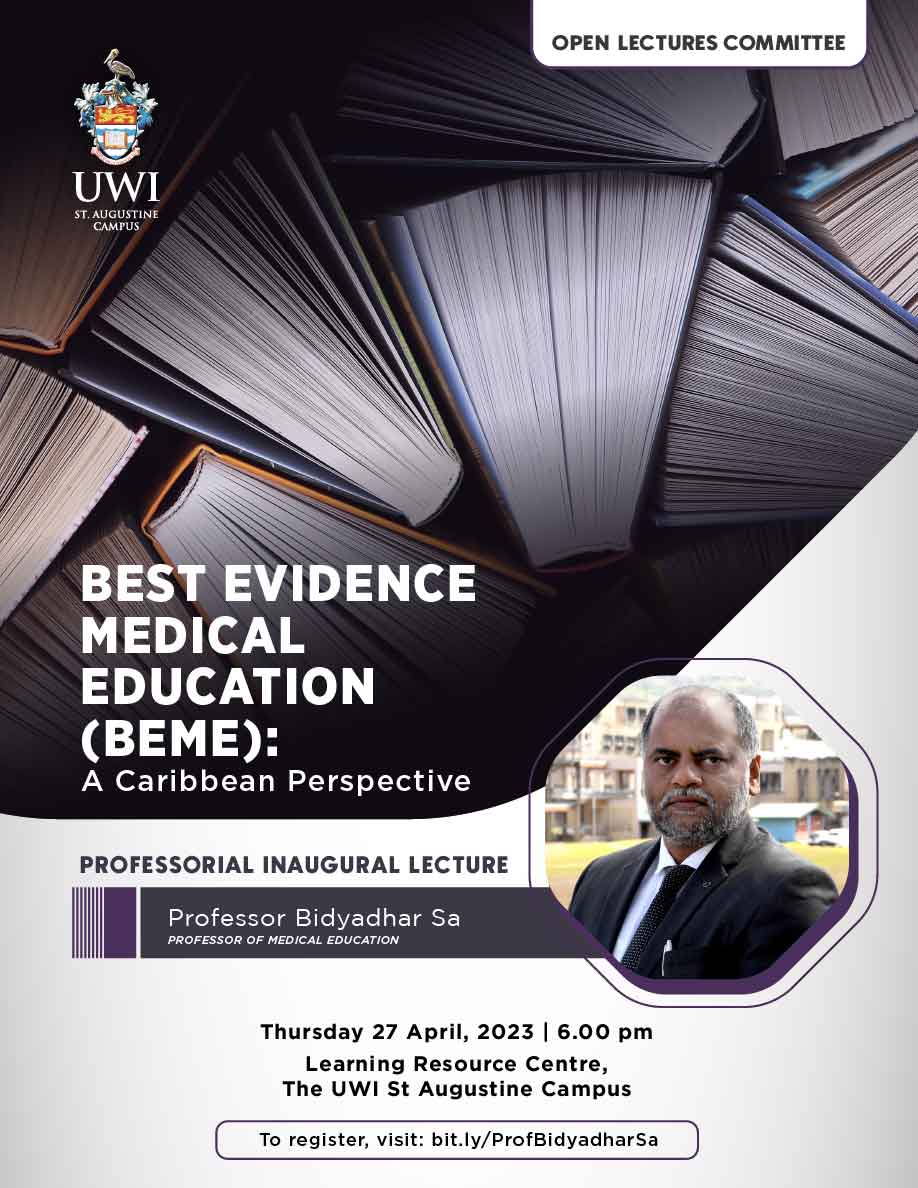Event
Professorial Inaugural Lecture: Best Evidence Medical Education (BEME)
Event Date(s): 27/04/2023
Location: The Learning and Resource Centre
The Open Lectures Committee invites you to Professor Bidyadhar Sa's Professorial Inaugural Lecture, Best Evidence Medical Education (BEME): A Caribbean Perspective on Thursday, April 27, at 6 p.m. at the Learning and Resource Centre.
To register, visit https://bit.ly/ProfBidyadharSa
Abstract:
The best evidence-based medical education (BEME) is data-driven and based on experiential proof as to what works and what does not work in medical education. Evidence-based education is located on a continuum between 100% opinion-based education and 100% evidence-based education. The need to transition from opinion-based education to evidence-based education has long been recognised by Caribbean medical educators. The BEME is the implementation by teachers, in their practice, of methods and approaches to education based on the best available evidence. It is a culture where the teacher is encouraged to question what is being practiced, look for best available evidence, relate it to their situation and apply their professional judgments. The results of studies undertaken at the University of the West Indies to collate evidence on multiple dimensions of medical education, particularly those elements of QUESTS framework: The Quality of the research evidence available, the Utility of the evidence, the Extent of the evidence, the Strength of the evidence, the Target or outcomes measured and the Setting or context; will be presented.
Additionally, the influence of cultural factors that impact learning and teaching BEME were examined in our Caribbean context. How the outcomes informed teaching and learning strategies and help to ensure that medical students receive the best possible education and are well-prepared to meet the health care needs of the Caribbean population; and faculty is supported across the campus in attaining and maintaining international standards, will be addressed.
Looking ahead, it is envisaged that BEME will have to rapidly pivot to address the need to embark upon technology integrated medical education which is catalysed by rapid advances in technology and fuelled by digital innovation in the age of big data and artificial intelligence (AI).
Biography:
Professor Bidyadhar Sa is Director of the Centre for Medical Sciences Education since 2011 and Deputy Dean for Quality Assurance and Accreditation in the Faculty of Medical Sciences at The University of the West Indies (UWI), St. Augustine Campus, 2018. Professor Sa earned his BA (Honours) in Education from Sambalpur University, Odisha in India, as well as an MA, MPhil and PhD, all from Kurukshetra University, Haryana in India. After leaving Addis Ababa University in Ethiopia as an Assistant Professor, he joined The UWI St Augustine Campus in 2008.
An educationalist and a researcher (whose research focus is Pedagogical Methods and Assessment in Medical Education), he has authored one book, one book chapter; one teaching module, more than fifty peer-reviewed journal articles, more than twenty-five policy position papers on medical education; combined with more than fifty poster and oral conference presentations. He has also delivered 17 lectures as Keynote/Plenary/Featured Speaker for Webinar/Scientific/Public fora.
He has attracted several intra-mural and extramural research grants as Principal Investigator and Co-Investigator, has served as an Independent External Examiner for more than thirty PhD theses so far, supervised more than thirty-seven Master theses, and is currently supervising two MPhil and two PhD students.
Professor Sa holds membership in many professional organizations and is a founding member of the International Forum of Researchers in Education. He is on the Editorial Board of the BMC Research Notes (A Springer-Nature Publication); West Indian Medical Journal; Advances in Human Biology (Medical Education Area only) and Journal of the All-India Association for Educational Research (AIAER). Prof Sa has been peer reviewer for twenty academic journals in the areas of his interest.
Prof Sa champions the quality agenda in the Faculty and was instrumental in piloting the Multiple Mini Interview (MMI), a widely used technique across the world for assessing the non-cognitive abilities of prospective entrants into health sciences programmes. His work has added a new dimension to the teaching and assessment of critical thinking and clinical reasoning skills in Phase-I of the medical education programmes across the FMS, so that they are in line with international standards. This has involved emphasising training and nurturing in the humanistic attributes (such as Empathy, Emotional Intelligence and Social Accountability) that 21st century medical training must provide to its students. His focus has extended to other areas that are central and critical to medical education practice, including providing training to faculty, staff and students across campuses by conducting more than 75 workshops. He also serves as an external peer evaluator for six regional and one international quality assurance and accreditation agencies. Across the UWI system, Professor Sa actively contributes to university life, having served as chair/member on dozens of committees and working groups.
The external reviewers noted “Dr. Sa will be best remembered for distinguished work, practical services and theorizing medical education mainly focused on pedagogical methods and assessment of medical education. His publications shed light on the most critical and highly contested topics in medical education that include teaching and assessment of critical thinking and clinical reasoning skills in medical education, PBL, active and engaging learning strategy. He has also notably addressed the most important human attributes that medical training needs to develop in the students; just beyond medical knowledge and skills. Personally, I am also extremely impressed with how Dr. Sa’ s research work is also blended with practice as it can be seen in the various training workshops and curriculum development ventures he was engaged in.”

Open to: | General Public |
CONTACT
Marketing and Communications Department
- Tel.: (868)-662-2002 ext.2013/2014
- Email: marketing.communications@sta.uwi.edu

